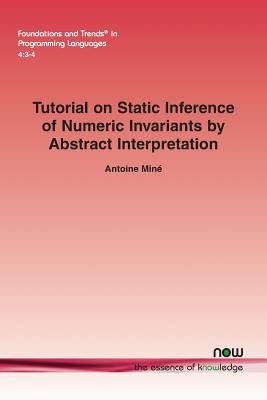
- We will send in 10–14 business days.
- Author: Antoine Miné
- Publisher: Now Publishers
- ISBN-10: 1680833863
- ISBN-13: 9781680833867
- Format: 15.6 x 23.4 x 1.4 cm, softcover
- Language: English
- SAVE -10% with code: EXTRA
Tutorial on Static Inference of Numeric Invariants by Abstract Interpretation (e-book) (used book) | bookbook.eu
Reviews
Description
This monograph presents Abstract Interpretation and its use to create static analyzers that infer numeric properties on programs. Abstract Interpretation, born in the late 1970s, has proven a very effective method to construct static analyzers. It has led to successful program analysis tools like PolySpace Verifier (The Mathworks) and the Astrée analyzer (AbsInt): industrial tools that are routinely used in the avionic, automotive, and space industries to help ensure the correctness of mission-critical software. Automatically inferring numeric invariants can be used to prove the absence of run-time errors, such as arithmetic overflows and out-of-bound array accesses, before the program is even run, while achieving a full coverage of the control and data space. This monograph is based on several Master-level courses in Abstract Interpretation given by the author. It is intended as an entry course in Abstract Interpretation, after which the reader should be ready to read the research literature on current advances in Abstract Interpretation, as well as more practical articles on the design of industrial-strength static analyzers for real languages.
EXTRA 10 % discount with code: EXTRA
The promotion ends in 20d.17:04:20
The discount code is valid when purchasing from 10 €. Discounts do not stack.
- Author: Antoine Miné
- Publisher: Now Publishers
- ISBN-10: 1680833863
- ISBN-13: 9781680833867
- Format: 15.6 x 23.4 x 1.4 cm, softcover
- Language: English English
This monograph presents Abstract Interpretation and its use to create static analyzers that infer numeric properties on programs. Abstract Interpretation, born in the late 1970s, has proven a very effective method to construct static analyzers. It has led to successful program analysis tools like PolySpace Verifier (The Mathworks) and the Astrée analyzer (AbsInt): industrial tools that are routinely used in the avionic, automotive, and space industries to help ensure the correctness of mission-critical software. Automatically inferring numeric invariants can be used to prove the absence of run-time errors, such as arithmetic overflows and out-of-bound array accesses, before the program is even run, while achieving a full coverage of the control and data space. This monograph is based on several Master-level courses in Abstract Interpretation given by the author. It is intended as an entry course in Abstract Interpretation, after which the reader should be ready to read the research literature on current advances in Abstract Interpretation, as well as more practical articles on the design of industrial-strength static analyzers for real languages.


Reviews